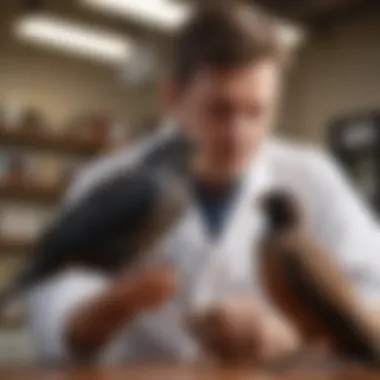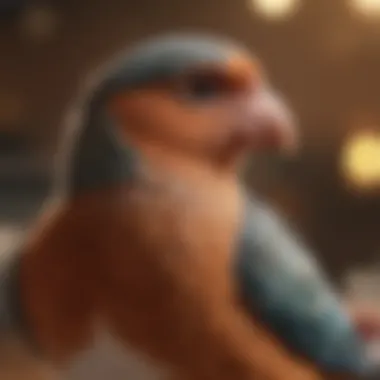Finding the Right Avian Veterinarian in Your Area


Any change in your bird's behavior could be a red flag. Always trust your instincts and seek professional help when in doubt.
Understanding the Role of an Avian Veterinarian
Avian veterinarians play a crucial role in the health and well-being of birds. Their specialization is vital due to the unique physiology and care requirements of avian species. Unlike general veterinarians, avian specialists focus exclusively on birds, providing tailored care that addresses their specific needs. This article explores the importance of understanding the role of an avian veterinarian and the benefits that come with seeking specialized care for your feathered companions.
Definition of an Avian Veterinarian
An avian veterinarian is a licensed veterinary professional who has received specialized training in the medical care of birds. This training often includes a deep understanding of avian biology, behavior, and common diseases. They are adept at diagnosing and treating various medical conditions that affect birds, ranging from routine check-ups to complex surgeries. Their knowledge extends beyond the typical health issues of domesticated pets, as birds possess distinct health challenges that require specific approaches.
Differences Between Avian and General Veterinarians
The difference between avian veterinarians and general veterinarians is significant. While general veterinarians can treat a range of animals, avian veterinarians focus solely on birds. Each species has its own anatomy, physiology, and health risks, which makes specialized knowledge essential. Only avian veterinarians typically have the necessary experience and resources to address specific avian health issues effectively. Moreover, they often have access to specialized equipment adapted for bird care, which is not always found in general veterinary clinics.
Common Species Treated by Avian Veterinarians
Avian veterinarians treat a wide variety of bird species. Common household birds include parrots, canaries, finches, and cockatiels. These species often present a range of health issues that vary greatly from those encountered in mammals. For instance, a parrot's diet, social needs, and habitat can significantly affect its health. Other species treated by avian vets might include birds of prey, waterfowl, and exotic birds. Tailoring care to meet the unique needs of each species is a critical aspect of an avian veterinarian's role, ensuring that all birds receive appropriate and effective medical care.
Importance of Specialized Avian Care
When it comes to the healthcare of pet birds, specialized avian care plays a crucial role. Birds are not only delicate creatures but also have unique physiological and psychological needs that differ significantly from those of other pets such as cats or dogs. For this reason, consulting a veterinarian who has expertise in avian medicine is imperative to ensure optimal health and well-being for your feathered companions.
Health Risks Unique to Birds
Birds face specific health risks that may not be apparent to owners. Unlike mammals, birds can mask illness until the condition becomes severe. Their respiratory systems are particularly vulnerable. For instance, exposure to environmental toxins, such as heavy metals or aerosol sprays, can lead to serious respiratory issues. Other risks include nutritional deficiencies, which are common because many owners may not fully understand a bird's dietary requirements.
Additionally, certain diseases such as psittacosis, a bacterial infection often affecting parrots, can be transmitted to humans. Avian veterinarians are trained to recognize these diseases, and their specific symptoms, facilitating timely diagnosis and treatment.
“Understanding the specific health risks your avian pet faces can significantly enhance their life quality and lifespan.”
Preventative Health Care for Birds
Preventative care is a cornerstone of avian veterinary practice. Regular check-ups are essential not only to monitor the overall health of your bird but also to catch any potential problems early. Routine examinations may include assessing your bird's weight, checking for signs of illness, and monitoring their feathers, skin, and beak.
Moreover, avian veterinarians can provide guidance on vaccination, which is particularly important in preventing diseases like West Nile virus and avian influenza. They can also recommend appropriate diets and behavioral enrichment activities to enhance your bird's mental and physical well-being.
Incorporating preventative care as part of your bird's routine can extend their lifespan and improve their quality of life. This proactive approach ensures that any issues are detected and addressed swiftly, saving both time and cost associated with more severe health interventions down the line.
How to Identify a Qualified Avian Veterinarian
Identifying a qualified avian veterinarian is crucial for the health and wellbeing of your pet bird. Unlike dogs or cats, birds have unique physiological and psychological needs that require specialized knowledge and skills. Engaging with the right veterinarian ensures that your feathered friend receives proper care, preventative treatment, and emergency support when needed.
It also aids in fostering a solid relationship between pet owner and veterinarian. This relationship creates a platform for effective communication regarding health issues, dietary requirements, and behavioral concerns. In summary, understanding how to identify qualified avian veterinarians leads to better outcomes for your bird.
Necessary Qualifications and Certifications
When searching for an avian veterinarian, verifying their qualifications and certifications is essential. An avian veterinarian should hold a Doctor of Veterinary Medicine (DVM) degree from an accredited veterinary school. After completing their DVM, they may pursue additional training in avian medicine through internships and residencies. Certifications from professional organizations such as the American Board of Veterinary Practitioners (ABVP) in Avian Practice demonstrate a commitment to excellence in the field.
Birds are not small mammals. They have distinct anatomical structures and health requirements. A qualified avian veterinarian will have studied avian anatomy, microbiology, pathology, and more. It's wise to inquire about ongoing education. Specialization in avian medicine means staying updated with the latest advancements and treatments available for birds.
Evaluating Experience and Specialization
The experience of a veterinarian is as important as their qualifications. Not all veterinarians have equal exposure to avian patients. You should research how long the practitioner has been treating birds. An established track record indicates familiarity with various species and common avian ailments. Additionally, some veterinarians may specialize in specific bird types such as parrots, canaries, or raptors.
When evaluating a potential avian veterinarian, consider asking specific questions like:
- What species of birds do you primarily treat?
- How many avian cases do you see annually?
- Are there any specific health issues you frequently manage?


These inquiries help understand if the veterinarian's experience aligns with your bird's needs. For instance, if you own a cockatiel, a vet who regularly treats cockatiels is preferable.
Understanding Veterinary Practice Standards
Veterinary practice standards play a significant role in the quality of care your bird receives. Look for a clinic that adheres to established guidelines from reputable associations, such as the American Veterinary Medical Association (AVMA) and the Association of Avian Veterinarians (AAV).
A qualified avian practice typically follows high standards in several areas:
- Cleanliness and safety: The clinic should maintain a sanitary environment to prevent infections.
- Diagnostic capabilities: Look for facilities that offer comprehensive laboratory services, X-rays, and other diagnostic tools conducive to avian care.
- Emergency protocols: An established emergency response plan shows preparedness for unexpected situations.
Resources for Locating Avian Veterinarians
Finding a qualified avian veterinarian is a critical step for bird owners. Specialized care can significantly impact the health and well-being of your pet. It is essential to explore various resources that will lead you to practitioners who have the necessary experience and knowledge in avian medicine. This section highlights several valuable resources to aid in your search.
Online Directories and Databases
Using online directories can be a practical first step in finding avian veterinarians. Websites specifically designed for veterinary professionals often provide searchable databases based on location. These directories usually include important information such as contact details, specialties, and client reviews. Finding a veterinarian who specializes in avian care through these platforms ensures you are looking at candidates suited for your bird's needs.
Some acknowledged platforms include:
- Veterinary Services: Many regional veterinary services have online listings.
- Local Veterinary Care Networks: These may connect you to experienced avian specialists.
- Bird-specific websites: Websites dedicated to bird ownership may list recommended veterinarians.
Professional Veterinary Associations
Professional associations serve as an authoritative source of information for pet owners. They often provide resources to locate avian veterinarians who meet rigorous standards for practice. Membership in a recognized association typically indicates a commitment to professional development and adherence to ethical standards.
Among the notable associations:
- Association of Avian Veterinarians (AAV): This organization offers a directory of avian veterinary professionals across various regions. Members typically have advanced training in avian health.
- American Veterinary Medical Association (AVMA): Although broader in focus, AVMA often provides resources and referrals for specialized care, including avian veterinarians.
- State Veterinary Associations: These can offer localized resources and may feature members specializing in avian medicine.
Local Animal Shelters and Rescue Organizations
Connecting with local shelters and rescue organizations can also facilitate finding an avian veterinarian. These establishments tend to have established relationships with veterinary clinics in the area. The staff at these organizations frequently possess firsthand knowledge of which veterinarians provide exceptional care for birds.
- Animal Rescue Groups: They often collaborate closely with veterinary clinics that treat birds and may provide a referral based on personal experiences.
- Local Shelters: Many shelters have their own veterinary staff or a list of preferred vets who oversee the care for birds in their rescue programs.
Utilizing these diverse resources can streamline your search and enhance the chances of finding a qualified avian veterinarian who meets your specific needs.
Evaluating the Veterinary Practice
Evaluating the veterinary practice is crucial when seeking care for your avian companion. It serves as a reflection of the quality of service you can expect, influencing both your comfort and your bird's health. This evaluation encompasses various aspects, including the office environment, personnel, and the availability of emergency services. By carefully assessing these elements, pet owners can ensure that their birds will receive the best possible care.
Office Environment and Facilities
The office environment plays a significant role in the overall veterinary experience. A clean and well-organized facility signals professionalism and dedication to animal care. The layout should allow for smooth movement, enabling staff to assist animals quickly and efficiently. Pay attention to the following aspects:
- Cleanliness: Is the waiting area tidy? Are the exam rooms sanitized?
- Equipment: Are there adequate medical tools and diagnostic devices?
- Comfort: Is there a space for birds to feel safe?
A welcoming atmosphere may also indicate that the practice values not only the owners but their pets' well-being as well. These positive signs can greatly reduce stress for both you and your bird during visits.
Staff Competence and Attitude
The competence and attitude of the veterinary staff contribute significantly to the quality of care provided. You should feel confident in their abilities to properly handle and treat your bird. Observing the staff's interactions can provide insights into their training and proficiency. Consider the following:
- Professionalism: Are the staff members dressed appropriately? Do they communicate clearly?
- Empathy: Are they friendly and approachable? Do they listen to your concerns?
- Qualifications: Look for certifications that indicate specialized training in avian care.
An engaged and knowledgeable team will help you feel secure in the decisions you make regarding your pet's health. They should be willing to answer your questions calmly and thoroughly.
Availability of Emergency Services


The availability of emergency services is a vital component in your evaluation. Birds can experience sudden health crises that require immediate attention. Knowing that you have quick access to help can bring peace of mind. Focus on these aspects:
- 24/7 Service Option: Does the practice offer emergency care outside of regular hours?
- Facility Capabilities: Are they equipped to handle urgent situations?
- Referral Resources: If unavailable, can they recommend nearby emergency clinics that specialize in avian care?
Understanding these factors can significantly influence your confidence in the chosen veterinarian. A reliable practice can help ensure that timely care is always accessible, which is essential for the well-being of your cherished bird.
Common Procedures Offered by Avian Veterinarians
Avian veterinarians play a crucial role in maintaining the health and well-being of birds. Their specialized knowledge enables them to provide comprehensive care tailored to the unique needs of avian species. Understanding the common procedures they offer is essential for pet owners who wish to ensure their birds receive the best possible health care.
Routine Health Exams
Routine health examinations are fundamental for all pets, and birds are no exception. These exams serve to assess overall health, enabling early detection of potential issues. During the visit, the veterinarian will conduct a thorough physical examination, including checking for signs of illness, assessing feather condition, and monitoring weight.
These evaluations help establish a health baseline, making it easier to notice changes in future visits. In addition, regular check-ups provide an opportunity to discuss dietary needs, preventive care, and behavioral concerns. By maintaining a schedule of routine exams, pet owners can greatly enhance the quality of life for their birds, reducing the risk of severe health problems.
Diagnostics and Laboratory Services
Diagnostic testing is vital for accurate diagnosis and effective treatment. Avian veterinarians often perform various laboratory services, such as blood tests, cultures, and radiographs, to gain insights into a bird’s health status. Blood work can reveal underlying diseases or imbalances that might not be apparent in a physical exam.
Moreover, diagnostic imaging helps in identifying issues related to bones, organs, and tissue. The results of these tests guide treatment plans tailored to the specific medical needs of the bird. Access to comprehensive diagnostic services is a hallmark of a quality avian practice and is critical for effective management of health conditions.
Surgical Services
Surgical care is an area where avian veterinarians shine due to their specialized skills. Birds may require surgery for various reasons, including reproductive health, trauma, or internal diseases. Common procedures include spaying or neutering, tumor removals, and orthopedic surgeries.
The surgical environment must be equipped with appropriate anesthesia and monitoring specifically designed for birds, as their physiology differs significantly from other pets. Post-operative care is equally important, as birds are particularly sensitive to stress during recovery. Avian vets not only perform the surgeries but also provide guidance for care after the procedure, ensuring the best recovery outcomes.
Regular consultations about common health procedures will help foster a stronger connection between you and your avian veterinarian.
Establishing a Relationship with Your Avian Veterinarian
A solid relationship with an avian veterinarian is essential for the well-being of your bird. Birds are unique pets with specific health needs. Establishing a strong bond with your veterinarian means you can obtain tailored care for your feathered companion.
Effective communication fosters trust, which is the foundation of this relationship. You should feel comfortable discussing your bird’s health, behavior, and any concerns you might have. A veterinarian who encourages questions tends to be more approachable. This openness can lead to better health outcomes for your bird.
Another benefit involves understanding treatments and recommendations. When you have a relationship built on trust and communication, medical advice can be more easily translated into actionable steps for pet owners. Knowing your veterinarian well can help you navigate complex issues like medicine and recovery processes.
Communication and Trust
Open communication is the lifeline of the relationship with your avian veterinarian. Birds often exhibit signs of illness in subtle ways. Thus, you need to feel free to express observations and concerns. A good veterinarian values your input, as you see your pet daily. When there is clear communication, timely interventions can occur.
Trust comes from experience and reassurance. A veterinarian who provides consistent care builds confidence. Over time, this trust can help to address difficulties or complications that may arise in your pet's health. Trust is also crucial when you are faced with difficult decisions about treatment or end-of-life care. It becomes easier to make choices when you believe your veterinarian has your bird's best interests at heart.
Understanding Treatment Plans
Every treatment plan should be transparent and easy to comprehend. When you meet with your avian veterinarian, take time to discuss the recommended treatment. This ensures that all aspects are clear. Understanding the reasons behind each step allows owners to follow through properly.
A sound treatment plan typically includes several components:
- Diagnosis: Understand the underlying issues affecting your bird's health.
- Objectives: What the treatment aims to achieve.
- Procedures: Step-by-step details of each procedure or medication.
- Aftercare: Necessary steps to take after treatment.
Engage actively in discussions regarding treatment. This engagement not only deepens your relationship with the veterinarian but also empowers you to better care for your pet. Informed owners are more inclined to stick to prescribed treatments. Ultimately, this leads to better health outcomes for avian patients.
Financial Considerations in Avian Veterinary Care
Understanding the financial aspects of avian veterinary care is crucial for pet owners. It helps you prepare adequately for the costs associated with your bird's health needs. Recognizing these expenses can mean the difference between giving your pet the appropriate care and risking their health due to financial limitations. It's important to consider both immediate costs, like check-ups, and potential long-term expenses, such as surgeries or chronic care needs.


Additionally, avian care can vary greatly based on location, the veterinarian's expertise, and the specific needs of your bird species. Taking the time to understand your financial obligations will empower you to make informed decisions regarding your pet’s well-being. In the following subsections, we will delve deeper into the costs of services and insurance options, as well as how to prepare for veterinary visits.
Cost of Services and Insurance Options
The cost of services rendered by an avian veterinarian can vary significantly. Routine examinations, vaccinations, and preventative care often have standard pricing. However, more complex procedures, like surgeries or specialized treatments, can incur much higher fees. Understanding these potential costs ahead of time is beneficial. Typical services you might encounter include:
- Routine check-ups: necessary for maintaining your bird's health.
- Emergency services: which can be costly but essential during critical situations.
- Laboratory tests: for diagnostics that identify health issues.
Insurance options for avian care are also available. Some pet owners might not realize that specific policies cover birds. Researching and comparing different insurance plans can offer financial relief in emergencies. Make sure to assess:
- Monthly premiums versus out-of-pocket costs.
- Coverage limits for specific treatments.
- Deductibles and co-pays.
These factors will guide you in selecting a plan that best suits your financial situation while ensuring your bird receives necessary medical care.
Preparing for Veterinary Visits
Preparing for visits to an avian veterinarian is a task that extends beyond just scheduling an appointment. It involves logistics and understanding what you need to bring. Before the visit, consider the following points:
- Documentation: Bring medical records, including any past diagnoses, surgeries, or previous treatments.
- List of Concerns: Have a written list of any behavioral changes, dietary habits, or symptoms that might concern you. This will aid the veterinarian in diagnosing any issues more effectively.
- Financial Readiness: Be ready for costs that might arise. Understandly, not all procedures may be quoted upfront, so having a flexible budget can help manage unexpected expenses.
A well-prepared visit not only ensures that your bird gets the best care possible but also helps mitigate anxiety for both you and your pet. Taking these steps can streamline the process and enhance your overall experience with avian veterinary care.
Navigating Challenges in Finding an Avian Veterinarian
Finding a qualified avian veterinarian can be challenging for pet owners, especially in certain locations. This section addresses the common obstacles encountered in the search and provides insights into overcoming these challenges. Understanding these elements can significantly improve the experience of avian pet owners and contribute to the health and well-being of their birds.
Limited Availability in Certain Regions
In many rural or less populated areas, finding an avian veterinarian can be particularly difficult. Some regions have very few specialists, making it challenging for pet owners to access necessary avian care. Birds have unique health needs, and without a knowledgeable veterinarian, those needs may go unmet.
Several factors can contribute to this scarcity. The concentration of veterinary practitioners in urban centers often means that rural areas lack specialized care. Furthermore, avian medicine is a niche field within veterinary science, and many veterinarians choose to focus on general practice or other types of animals instead.
Pet owners in these locations must be proactive. Here are a few strategies to consider:
- Traveling to the Nearest Specialist: Sometimes, this may involve significant travel. Options for distance care may include planning regular visits or consultations.
- Online Consultations: Some veterinarians may offer telehealth services, allowing discussions regarding your bird's health without traveling.
- Networking with Other Pet Owners: Engaging with local bird owners can provide leads on veterinary services that others have successfully used.
Assessing Quality in Remote Areas
When finding an avian veterinarian in remote or underserved areas, quality becomes a significant concern. Limited options don't mean a lack of quality. Pet owners must critically assess potential veterinarians and their practices.
To evaluate a veterinarian's capabilities, consider the following:
- Conducting Research: Look for reviews or testimonials from other clients. Websites like Facebook and Reddit may have community groups where pet owners share experiences.
- Inquiring about Credentials: It is crucial to ask about their qualifications specific to avian medicine. A veterinarian with extensive training in this area will demonstrate a commitment to appropriate care.
- Visit the Practice: If possible, visit the veterinary practice to observe the environment. A clean and organized office is often indicative of a quality practice.
"Finding a specialist may take time, but investing effort into research can pay off in your pet's health and happiness."
The Future of Avian Veterinary Medicine
The field of avian veterinary medicine is rapidly evolving. Understanding the future of this specialty is crucial for pet owners and advocates of avian health. This landscape influences not just the way veterinarians treat birds but also how they engage with pet owners regarding avian care. Specialized knowledge and advanced techniques in avian medicine may significantly improve outcomes for pet birds.
Emerging Technologies in Avian Care
Technology is changing how we approach veterinary medicine. With advancements in diagnostic tools and minimally invasive surgeries, veterinary care for birds is becoming more effective and less stressful.
- Telemedicine is a notable example. It provides a way for pet owners to consult with avian specialists without needing to travel. This is particularly helpful in regions with limited access to qualified avian veterinarians.
- Wearable health monitors for pets are another emerging technology. These devices can track a bird's behavior and vital signs in real time. This continuous data can be invaluable for preventive health measures, allowing veterinarians to make informed decisions based on current health metrics.
- 3D printing has also started to play a role in crafting custom prosthetics or surgical implants. This technology can greatly enhance recovery outcomes for birds needing specialized care.
Advancements in Avian Health Research
Research in avian health is progressing, providing new insights that lead to better treatment methodologies. Some key areas of focus include:
- Avian nutrition studies, aiming to identify specific dietary needs for various species. Improving diets can prevent a range of health issues.
- Genetic research is uncovering the heritable diseases within specific bird breeds. Understanding genetic predispositions can lead to better preventative strategies.
- Behavioral studies are helping us comprehend the social and psychological needs of pet birds. Satisfying these needs is as essential as providing physical health care.
Each of these advancements signifies a broader understanding of avian health and a shift towards preventive rather than reactive care. Pet owners who stay informed will be better equipped to care for their birds.
“Investing in avian health research is investing in the future.”







